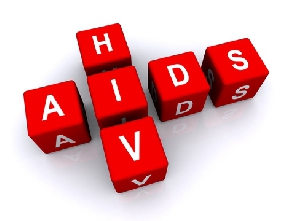A total of 239 HIV-positive cases were recorded out of 140,000 kits distributed during the self-testing programme piloted in 50 districts across the country.
Out of that number, 202 persons representing 72 percent were females and 28 percent of males have been counseled and linked to care for treatment while 37 of them have not availed themselves of care due to denial.
These were findings from the HIV self-testing programme piloted by the Ghana HIV and AIDS Network (GHANET) in collaboration with the National AIDS Control Programme (NACP).
The HIV Self-testing initiative was launched in July 2022 as part of efforts to achieve the UNAIDS 95-95-95 targets by the year 2030.
The initiative was to target persons who would not avail themselves at the health facilities at all for testing to know their status and it allows people to do the testing confidentially in the comfort of their homes.
According to the findings, more women were reached, representing 60 percent with 40 percent of them being men.
It said persons aged between 20 and 44 years accounted for a significant number of all confirmed positive cases while the highest age group linked to care was between 20 and 34 constituting 49 percent.
Mr. Ernest Amoabeng Ortsin, President of GHANET, who made this known during the dissemination of results on the HIV Self-Test project, said the key population targeted were students, petty traders, farmers, beauticians and seamstresses, fish farmers, and fishmongers, among others.
He explained that the self-test process was supposed to be confidential and as such people were unwilling to confirm their test due to fear of stigmatization.
"Positive persons who had not been linked to care for treatment are still in denial, ignorance, some have traveled, unwillingness to visit health facility and baseline cost of treatment. These are the biggest challenges to the pilot programme."
Mr Ortsin said despite the challenge the initiative had put 202 people who otherwise would not have known their status on treatment and was hopeful that many more would link themselves to health facilities.
The GHANET President called for more funds to significantly scale up the initiative nationwide.
"In Ghana, it is estimated that 100,000 people are living with HIV but are not aware so projects such as this are contributing towards finding that number. If we scale it up it means we will be getting more of such people, going forward we have to support these 202 people to achieve viral load suppression," Mr Ortsin added.
Dr Stephen Ayisi-Addo, Programme Manager, NACP, commended GHANET for the effort in getting 202 persons into care and treatment.
“We need to do more and let the people know that HIV is no more a death sentence and we need to run home that message so that people will be free to get to know their status and be on treatment like diabetes and hypertension."
He said: “We are going to scale up and I think they have done well because it was a hundred thousand (100,000) target, which means they can do more, it is left for us to get the commodities for them.
“If we have strong evidence of impact then programmatically we can continue to justify funding together with our partners so there will be money for that and given the results I am seeing, we are in a good position to make a case,” he added.
Mr. Ayisi-Addo said the next phase of the programme would identify the male population, saying: “We know generally that the health-seeking behavior of men is lower compared to females. The men will not come to the clinic at all, so we need to get into the communities and focus on them.”
He encouraged GHANET and partners to begin looking at that aspect because the programme identified that men were being left behind.
He assured them of the NACP's readiness to partner with stakeholders in the HIV and AIDS response to achieve set targets.
The Programme Manager said to sustain the programme, several interventions would be put in place to ensure sustainability, adding that the programme would begin to focus on the District Assembly Common Fund allocation for HIV to support in that regard.
Health News of Friday, 29 March 2024
Source: GNA













